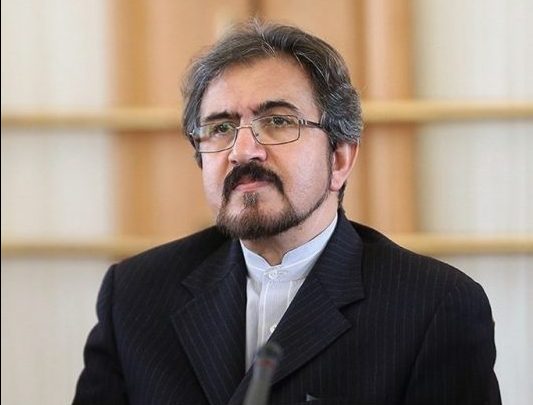Speaking in a Farsi interview with the Jame Jam daily newspaper, Qassemi said the Islamic Republic’s trust in the US has been considerably lost because Washington has broken its promises.
Qassemi stated that recent experiences suggest some countries that claim to be a superpower are not reliable stressing that the wall of distrust between Tehran and Washington has become taller, especially after the JCPOA.
“The US withdrawal from the Paris Treaty, the NAFTA, and negotiations with Europe in the economic fields have led to the deepening of the differences in the West. Therefore, given the intensification of the hostile attitude of the United States towards our country, it is not reasonable to talk about negotiating with the US. We have to wait and see if Washington will take a wise approach.”
The Iranian Spokesperson also added that today, the United States only seeks to make money by selling arms to some countries in order to create gaps among the countries of the world, especially in the West Asia and Muslim countries.
“We are a country able to solve many problems. Although we believe in dialogue and engagement with other countries, the global conditions must be fair and respectful for all sides. However, this is not wise to assume that negotiating with the United States is a key to solve some of Iran’s problems,” noted Qassemi.
He said foreign policy has so far been the arena of a confrontation between Iran and the dominant powers of the East and the West, but recent experiences suggest some countries which claim to be a superpower are not reliable.
“The foreign policy of the Islamic Republic of Iran is one of the most important manifestations of the country’s political independence and national dignity,” added Qassemi.
He further mentioned that supporting the Palestinian cause against the Zionist regime is one of the other principles of the foreign policy of the Islamic Republic, which, despite many costs, Tehran has constantly insisted on.
“Today, the Islamic Republic of Iran is a pioneer in defending the oppressed nation of Palestine and confronting the aggression and bullying of the Israeli regime. The foreign policy of the Islamic Republic of Iran is based on the principles of protecting the oppressed and Muslims everywhere in the world. Therefore, we are recognized as the greatest supporter of the oppressed people in the world.”
He also noted that one of the most successful timespans in Iran’s foreign policy was at the time of war (against Iraq). Qassemi said a particular foreign policy had to be pursued during the war due to the difficult conditions, adding that despite all the problems, Iran’s foreign policy achieved many successes at that time.
He said that the UN Security Council Resolution 598 was an important achievement for the Islamic Republic of Iran at the very sensitive stages of the war.
“In the post-war period, we could reconstruct our foreign relations. We began our negotiations with the European Union and started economic, commercial, and industrial interactions with many countries to rebuild the country. Over $40 billion in foreign investment was absorbed, which could be effective in re-starting the Iranian economy, which was somewhat stopped by the war.”
Iran’s foreign ministry spokesman further pointed out that the nuclear deal, like Resolution 598, is seen as the beginning of a series of positive actions in foreign policy that have been approved by the Establishment.
“Despite the sanctions, we cleverly removed or reduced barriers,” underscored Qassemi.
Regarding the negotiations with the US, the Iranian senior diplomat said dialogue and interaction with the world, as emphasized by the Leader of the Islamic Revolution, is not a taboo. At the same time, conversation must have its own conditions. Iran is a powerful country having a good status in the region and in the world.
“We are in possession of good defensive capabilities, and we are not afraid of conducting negotiations with any country. We have to see whether others are really looking for dialogue or they only intend to use dialogue as a means to maintain their domination.”
